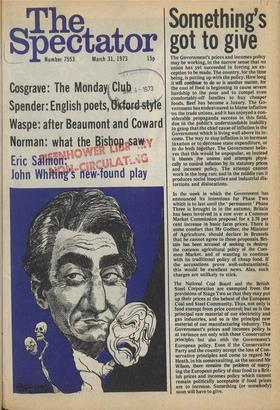Something's got to give
The Government's prices and incomes policy may be working, in the narrow sense that no union has yet succeeded in forcing an exception to be made. The country, for the time being, is putting up with the policy. How long it will continue to do so is another matter, for the cost of food is beginning to cause severe hardship to the poor and to compel even comfortably-off families to buy cheaper foods. Beef has become a luxury. The Government has endeavoured to blame inflation on the trade unions, and it has enjoyed a considerable propaganda success in this field, due to the public's understandable inability to grasp that the chief cause of inflation is the Government which is living well above its income. The way to stop inflation is to increase taxation or to decrease state expenditure, or to do both together. The Government believes that this would be unpopular, so instead it blames the unions and attempts physically to control inflation by its statutory prices and incomes policy. The attempt cannot work in the long run; and in the middle run it produces social inequities and industrial distortions and dislocations.
In the week in which the Government has announced its intentions for Phase Two which is to last until the permanent' Phase Three is brought in in the autumn, Britain has been involved in a row over a Common Market Commission proposal for a 2.76 per cent increase in basic farm prices. There is some comfort that Mr Godber, the Minister of Agriculture, should declare in Brussels that he cannot agree to these proposals. Britain has been accused of seeking to destroy the common agricultural policy of the Common Market. and of wanting to continue with its traditional policy of cheap food. If the accusations prove well-substantiated, this would be excellent news. Alas, such charges are unlikely to stick.
The National Coal Board and the British Steel Corporation are exempted from the provisions of Stage Two so that they may put up their prices at the behest of the European Coal and Steel Community. Thus, not only is food exempt from price control; but so is the principal raw material of our electricity and gas industries, and so is the principal raw material of our manufacturing industry. The Government's prices and incomes policy is at variance not only with these Conservative principles but also with the Government's European policy. Even if the Conservative Party and the country accept the loss of Conservative principles and come to regard Mr Heath, in his somersaulting, as the second Mr Wilson, there remains the problem of marrying the European policy of dear food to a British prices and incomes policy which cannot remain politically acceptable if food prices are to increase. Something (or somebody) soon will have to give.


































